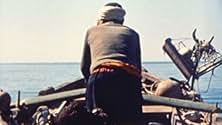I gave it a 10 originally, but I don't know why. Nothing happens in this movie. Literally. Sound similar?
*Wavelength.
*Dog Star Man.
Yes, that's right. Mediterranee is avant-garde- a film genre where, according to Wikipedia, are:
"people or works that are experimental, radical, or unorthodox with respect to art, culture, or society.It may be characterized by nontraditional, aesthetic innovation and initial unacceptability, and it may offer a critique of the relationship between producer and consumer."
This is simply a genre I do not care for, aside from Scorpio Rising. That is unique and very good. This is not.
I'm sorry,but experimental films, for the most part, fail as entertainment.















